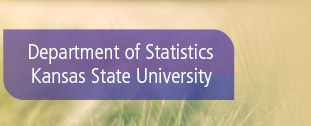Abstract
In a gene expression experiment (using oligo array, RNA-Seq, or other platform), researchers typically seek to characterize di erentially expressed genes based on common gene function or pathway involve-ment. The eld of gene set testing provides numerous characterization methods, some of which have proven to be more valid and powerful than others. These existing gene set testing methods focus on experimental designs where there is a single null hypothesis (usually involving association with a continuous or categorical phenotype) for each gene. Increasingly common experimental designs lead to multiple null hypotheses for each gene, and the characterization of these multivariately di erentially expressed genes is of great interest. We explore extensions of existing gene set testing methods to achieve this characterization, with application to a RNA-Seq study in livestock cloning.
Keywords
gene expression, gene set testing, gene set enrichment
Creative Commons License

This work is licensed under a Creative Commons Attribution-Noncommercial-No Derivative Works 4.0 License.
Recommended Citation
Stevens, John R. and Isom, S. Clay
(2012).
"GENE SET TESTING TO CHARACTERIZE MULTIVARIATELY DIFFERENTIALLY EXPRESSED GENES,"
Conference on Applied Statistics in Agriculture.
https://doi.org/10.4148/2475-7772.1032
GENE SET TESTING TO CHARACTERIZE MULTIVARIATELY DIFFERENTIALLY EXPRESSED GENES
In a gene expression experiment (using oligo array, RNA-Seq, or other platform), researchers typically seek to characterize di erentially expressed genes based on common gene function or pathway involve-ment. The eld of gene set testing provides numerous characterization methods, some of which have proven to be more valid and powerful than others. These existing gene set testing methods focus on experimental designs where there is a single null hypothesis (usually involving association with a continuous or categorical phenotype) for each gene. Increasingly common experimental designs lead to multiple null hypotheses for each gene, and the characterization of these multivariately di erentially expressed genes is of great interest. We explore extensions of existing gene set testing methods to achieve this characterization, with application to a RNA-Seq study in livestock cloning.

